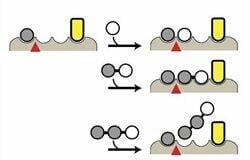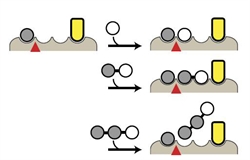Monobodies: Little Molecules that Alter Enzymatic Activity

Enzymatic activity can now be modified without altering the enzyme. Researchers at the University of Chicago changed the specificity of an enzyme, commonly used in the food industry, with synthetic proteins they called monobodies. The discovery, published in Nature Chemical Biology, opens the door to fine-tuning dozens of molecular reactions with commercial applications.
Enzymes are proteins that catalyze chemical reactions. They are indispensable to sustain cellular life, as they accelerate metabolic reactions that otherwise would take millions of year to happen. Enzymatic activity is very specific,their targets being defined by the complementarity between enzyme and substrate structure. Many enzymes, mostly modified by protein engineering, are used as catalysts in the chemical industry. Cellulases are used in the fuel industry, lipases as detergents and in the dairy industry, amylases and proteases in the food industry, xylanases in the paper industry, etc.

Monobody (in yellow) located at the enzyme´s active site hampers the use of large sugars as substrates. From: Dr. Shohei Koide.
Looking for a monobody that changes enzyme specificity
Dr. Shoide and his team have, for the first time, modified enzymatic activity by engineering synthetic accessory molecules, called monobodies, instead of the enzyme itself. They experimented with the enzyme beta-galactosidase (β-Gal), which breaks down complex sugar molecules into monosaccharides. They aimed to induced β-Gal to only take small sugar chains as substrates, which is much more valuable for the industry. Previous β-Gal mutations (more than 1000) were unable to achieve that goal. The researchers tried then to find a monobody that had that effect on β-Gal. They started from a pool of 10 billion monobodies and, by directed evolution, they sorted out which molecules bound to the active site of β-Gal. Finally they selected a molecule that produced the desired effect in β-Gal activity.
Mass production of monobodies is cheap, and some biotech companies already produce them for alternative applications. Many other enzymes could be altered by monobodies, increasing the commercial possibilities of the enzyme-based industry.
Source: genengnews

